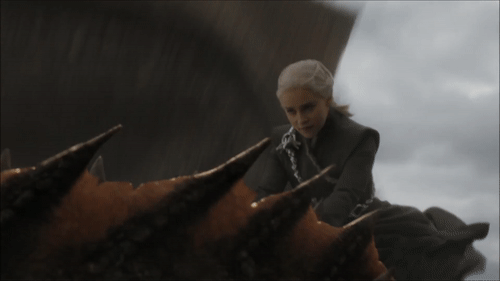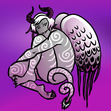Siavahda's Blog, page 104
September 2, 2019
Must-Have Monday; September’s Epic Releases, Part #1
I have yet to find out why, but I noticed years ago that March and September both seem to be major months for fantasy releases. Since March is my birthday, I’m not complaining in the least, and this September promises to be especially epic! So this month’s Must-Have Monday posts will be dedicated to keeping everyone up to date with all the fab books September’s spoiling us with.
All the books listed here are out tomorrow.
 The Unkindest Tide (October Daye, #13) by Seanan McGuire
The Unkindest Tide (October Daye, #13) by Seanan McGuire Published by DAW Books on 3rd September 2019
Buy on Amazon, The Book Depository
Goodreads
Hundreds of years ago, the Selkies made a deal with the sea witch: they would have the sea for as long as she allowed it, and when the time came, she would call in all their debts at once. Many people assumed that day would never come. Those people were wrong.
When the Luidaeg—October "Toby" Daye's oldest and most dangerous ally—tells her the time has come for the Selkies to fulfill their side of the bargain, and that Toby must be a part of the process, Toby can't refuse. Literally. The Selkies aren't the only ones in debt to the Luidaeg, and Toby has to pay what she owes like anyone else. They will travel to the fabled Duchy of Ships and call a convocation of the Selkies, telling them to come and meet the Luidaeg's price...or face the consequences.
Of course, nothing is that simple. When Dianda Lorden's brother appears to arrest Dianda for treason against the Undersea, when a Selkie woman is stripped of her skin and then murdered, when everything is falling apart, that's when Toby will have to answer the real question of the hour.
Is she going to sink? Or is she going to swim?
First up is book thirteen (!!!) in Seanan McGuire’s amazing October Daye series. All the Daye books are written with little recaps in the opening pages, so new readers can jump in wherever they want to if that’s truly their heart’s desire; however, I recommend beginning at the beginning, because you’re truly missing out otherwise. One of the things that makes this series so special is McGuire’s incredible ability to lay the groundwork for future twists, turns and reveals five or six books in advance; details you don’t even note as you read them turn out to have world-changing implications later in the series, and revelations or dei ex machina that at first glance break the rules can be traced back to offhand comments in the very first or second book. I don’t know if McGuire has a photographic memory, or if she just has a whole wall of her house covered in October Daye notes that are all connected to each other with different colored strings, but somehow she keeps track of everything and nothing – absolutely nothing – is ever meaningless or unintentional in these books.
Unkindest Tide promises to finally deal with the selkies, something that the series has been building up to for a while, and I really don’t think you’ll get the full impact of whatever’s coming without all that context. I’m not usually a urban fantasy fan myself, but I urge anyone with doubts to try the first two or three books; they’re pretty short, very readable, and will excite anyone who wants to geek out on their faerie lore (I knew I’d found something special when the pronunciation guide of book one listed mythical creatures I knew, but that I’d never seen in fiction before. Or since, for that matter!) And although I usually decry first-person narration – with the argument that most narrators just aren’t unique enough to make being in their head that interesting – October, the eponymous lead character, really is unique, even if you might not think so at first glance, and I’m constantly glad McGuire decided to write this series in first-person instead of third – not something I say often.
So fans of this series should already have this pre-ordered; everyone else can take this as a reminder to go check out these books already!
 There Will Come a Darkness (The Age of Darkness, #1) by Katy Rose Pool
There Will Come a Darkness (The Age of Darkness, #1) by Katy Rose Pool Published by Henry Holt Books for Young Readers on 3rd September 2019
Buy on Amazon, The Book Depository
Goodreads
The Age of Darkness approaches.Five lives stand in its way.Who will stop it... or unleash it?
For generations, the Seven Prophets guided humanity. Using their visions of the future, they ended wars and united nations―until the day, one hundred years ago, when the Prophets disappeared.
All they left behind was one final, secret prophecy, foretelling an Age of Darkness and the birth of a new Prophet who could be the world’s salvation . . . or the cause of its destruction. As chaos takes hold, five souls are set on a collision course:
A prince exiled from his kingdom.A ruthless killer known as the Pale Hand.A once-faithful leader torn between his duty and his heart. A reckless gambler with the power to find anything or anyone.And a dying girl on the verge of giving up.
One of them―or all of them―could break the world. Will they be savior or destroyer? Perfect for fans of Throne of Glass, Children of Blood and Bone, and An Ember in the Ashes.
This is a debut novel from a debut author I’m unfamiliar with. There’s been a huge amount of hype around this one. I have to admit I’m not getting the vibe that says this will be a good fit for me, and I haven’t enjoyed the excerpts posted on sites like EW and Hypable, but it ticks enough boxes that I think a lot of other readers are going to enjoy it!
 Kingdom of Souls by Rena Barron
Kingdom of Souls by Rena Barron Published by HarperVoyager on 3rd September 2019
Pages: 496
Buy on Amazon, The Book Depository
Goodreads
Magic has a price—if you’re willing to pay.
Born into a family of powerful witchdoctors, Arrah yearns for magic of her own. But each year she fails to call forth her ancestral powers, while her ambitious mother watches with growing disapproval.
There’s only one thing Arrah hasn’t tried, a deadly last resort: trading years of her own life for scraps of magic. Until the Kingdom’s children begin to disappear, and Arrah is desperate to find the culprit.
She uncovers something worse. The long-imprisoned Demon King is stirring. And if he rises, his hunger for souls will bring the world to its knees… unless Arrah pays the price for the magic to stop him.
Another debut, from another debut author. I first came across this one back before it had a cover or a proper title attached to its Goodreads listing, and put it on my to-watch-for list, but I probably wouldn’t have gone ahead a pre-ordered it if not for this excerpt of the opening chapters, which I liked a lot despite the first-person voice – it sounds like there’s plenty of really cool worldbuilding here, and the writing style seems to have just enough description to keep me happy. It’s also fab to see a brown girl on a YA fantasy cover, which is something that’s still too rare.
 The Mythic Dream by Dominik Parisien, Navah Wolfe, Indrapramit Das, Amal El-Mohtar, Sarah Gailey, Carlos Hernandez, Kat Howard, Stephen Graham Jones, T. Kingfisher, Ann Leckie, Carmen Maria Machado, Arkady Martine, Seanan McGuire, Naomi Novik, Rebecca Roanhorse, Alyssa Wong, J.Y. Yang, John Chu, Leah Cypess
The Mythic Dream by Dominik Parisien, Navah Wolfe, Indrapramit Das, Amal El-Mohtar, Sarah Gailey, Carlos Hernandez, Kat Howard, Stephen Graham Jones, T. Kingfisher, Ann Leckie, Carmen Maria Machado, Arkady Martine, Seanan McGuire, Naomi Novik, Rebecca Roanhorse, Alyssa Wong, J.Y. Yang, John Chu, Leah Cypess Published by Gallery / Saga Press on 3rd September 2019
Pages: 368
Buy on Amazon, The Book Depository
Goodreads
An all-new anthology of eighteen classic myth retellings featuring an all-star lineup of award-winning and critically acclaimed writers.
Madeleine L’Engle once said, “When we lose our myths we lose our place in the universe.” The Mythic Dream gathers together eighteen stories that reclaim the myths that shaped our collective past, and use them to explore our present and future. From Hades and Persephone to Kali, from Loki to Inanna, this anthology explores retellings of myths across cultures and civilizations.
Featuring award-winning and critically acclaimed writers such as Seanan McGuire, Naomi Novik, Rebecca Roanhorse, JY Yang, Alyssa Wong, Indrapramit Das, Carlos Hernandez, Sarah Gailey, Ann Leckie, John Chu, Urusla Vernon, Carmen Maria Machado, Stephen Graham Jones, Arkady Martine, Amal El-Mohtar, Jeffrey Ford, and more, The Mythic Dream is sure to become a new classic.
I’ve been in love with mythology since I was a little kid – growing up in Ireland, where no one believes in faeries but no one will touch a tree belonging to the Good Folk for love nor money, will do that to you. So I’m always hopeful about collections like this one, although I’m crossing my fingers that it’s not packed full of reiterations of the Greek myths – unless it’s about a modernised Persephone, I’m pretty bored with the Greek legends. This one’s been hyped a lot and is featuring a lot of great authors, so I guess we’ll see how it goes! (The lovely cover doesn’t hurt, either.)
That’s four of the biggest releases this week! Did I miss any you’re excited for? Let me know!
August 25, 2019
State of the Sia + Book News!
Things have been a little quiet around here, but that just means there’s a lot to catch-up on! Let’s get started, shall we?
Some personal news first: I went to WorldCon! It was wonderful and a little overwhelming; I really wish I’d been able to go with a friend, as was the original plan. But Dublin (which hosted the con this year) is my home ground, and Catherynne Valente was not only attending, her book Space Opera was up for the Hugo – so there was no question of not going!
Honestly, Valente was my entire reason for going – no way was I going to miss out on one of her rare trips to Europe! – and I can happily say that she was entirely worth it. She wrote a beautiful inscription in my copy of The Girl Who Raced Fairyland All The Way Home, I was able to give her a slightly squashed scroll (handing over a letter seemed like the best way to gush without embarrassing myself, making her feel awkward, or holding up the signing line), and I even got to hear her read from Space Opera. (Her husband narrates audiobooks and is amazing at it, but for the record she could absolutely do it herself if she wanted to. She makes for a fantastic reader; I don’t think I’ll ever be able to reread Space Opera without hearing it in her voice.) So that was an Epic Win.
Among various other things, I was able to attend a reading by Sarah Rees Brennan, a panel on Hopepunk by Alexandra Rowland herself, a wonderful kaffeekleetch with Jenn Lyons (author of Ruin of Kings, which I must sit down and review soon!), and an absolutely hilarious panel on non-humans in spec-fic romances, of which KM Szpara was the undoubted star (like I needed any more reasons to be excited for his book Docile.) I spent one day wandering around in my galaxy-print suit and bowler hat, could not find Tor anywhere in the Dealer’s Hall, and bonded with a Finnish Scott Lynch fan at a table selling first-editions. (I was debating grabbing a first-ed Lies of Locke Lamora, and am very happy it went home with her instead!)
There was some personal, non-convention-related drama to deal with while I was in Dublin which was not nearly so much fun, but ultimately it was a really great trip!
(Except for Space Opera not winning the Hugo. I’m still furious.)
Now for some general book news!
 The Queen's Bargain (The Black Jewels #10) by Anne Bishop
The Queen's Bargain (The Black Jewels #10) by Anne Bishop Published by Ace on 10th March 2020
Genres: Secondary World Fantasy
Pages: 448
Buy on Amazon, The Book Depository
Goodreads
POWER HAS A PRICE. SO DOES LOVE.
Return to the dark, sensual, and powerful world of the Black Jewels in this long-awaited new story in the New York Times bestselling fantasy saga
After a youthful mistake, Lord Dillon’s reputation is in tatters, leaving him vulnerable to aristo girls looking for a bit of fun. To restore his reputation and honor, he needs a handfast—a one-year contract of marriage. He sets his sights on Jillian, a young Eyrien witch from Ebon Rih, who he believes has only a flimsy connection to the noble society that spurned him. Unfortunately for Dillon, he is unaware of Jillian’s true connections until he finds himself facing Lucivar Yaslana, the volatile Warlord Prince of Ebon Rih.
Meanwhile, Surreal SaDiablo’s marriage is crumbling. Daemon Sadi, the Warlord Prince of Dhemlan, recognizes there is something wrong between him and Surreal, but he doesn’t realize that his attempt to suppress his own nature in order to spare his wife is causing his mind to splinter. To save Daemon, and the Realm of Kaeleer if he breaks, help must be sought from someone who no longer exists in any of the Realms—the only Queen powerful enough to control Daemon Sadi. The Queen known as Witch.
As Jillian rides the winds of first love with Dillon, Daemon and Surreal struggle to survive the wounds of a marriage turned stormy—and Lucivar has to find a way to keep everyone in his family safe…even from each other.
Anne Bishop is publishing a new book in the Black Jewels series! The Queen’s Bargain will be out next year, making it eight years since the last Black Jewels instalment, which we all believed would be the last. Although I don’t love the books quite as much as I once did (a topic for another post), it’s still very important to me, not least because it remains one of the series my best friend and I are equally passionate about. (We’re working on adapting it for an imaginary tv show, complete with scripts and costume design. It’s been a hell of a lot of fun!) I already have my copy of Queen’s Bargain pre-ordered!
 The Seared Lands (The Dragon’s Legacy, #3) by Deborah A. Wolf
The Seared Lands (The Dragon’s Legacy, #3) by Deborah A. Wolf Representation: PoC
Genres: Secondary World Fantasy
Buy on Amazon, The Book Depository
Goodreads
This book, while following the previous stories, focuses a great deal on the Illindrist, Aasah, and his apprentice Yaela, strange people with stranger powers who come from a land of salt and fire.
In the days of the Sundering, Quarabala--the Seared Lands--were cursed by Akari Sun Dragon and scorched beyond all recognition. Now a cruel place inhabited by nightmare beasts, the Seared Lands are home to a desperate few; and as fears of a second Sundering grow, these people look to greener lands. If no place is found for them, they will seize new lands from the soft hands of Those Who Dwell Above.
They have nowhere else to go, they have nothing to lose...
And this time, they are not alone.
In far less cool news, Searing Lands, the third (AND POSSIBLY FINAL?!) book in the Dragon’s Legacy series has been pushed back from September to next March. Sigh. On the other hand, given that my birthday is March 1st, this does mean it has now become my birthday present, and I can definitely live with that.
 Reverie by Ryan La Sala
Reverie by Ryan La Sala
Representation: Queerness everywhere
Published by Sourcebooks Fire on 3rd December 2019
Genres: Queer Protagonists, Urban Fantasy
Pages: 416
Buy on Amazon, The Book Depository
Goodreads
Inception meets The Magicians, except with better wigs and a maniacal drag queen sorceress attempting to unravel the reality of Connecticut (yes, the state) and replace it with something…well something better than Connecticut.
Ryan La Sala’s debut fantasy is an #OwnVoices story following Kane Montgomery, a gay teenager piecing his life back together after an attack robs him of his memories. As Kane searches for who he was, he uncovers a war for the creative rights to reality itself, each battle played out in an imagined world turned real: a reverie.
Reveries are worlds born from a person’s private fantasies, and once they manifest they can only be unraveled by bringing their conflicts to resolution. Reveries have rules and plots, magic and monsters, and one wrong step could twist the entire thing into a lethal, labyrinthine nightmare. Unraveling them is dangerous work, but it’s what Kane and The Others do.
Or did, until one of The Others purged Kane of his memories. But now Kane is back, and solving the mystery of his betrayal is the only way to unite his team and defeat reality’s latest threat: Poesy, a sorceress bent on harvesting the reveries for their pure, imaginative power.
But what use might a drag queen sorceress have with a menagerie of stolen reveries? And should Kane, a boy with no love for a team that betrayed him, fight to stop her, or defect to aid her?
Reverie is about the seduction of escaping inwards, about the worlds we hide within ourselves, and the danger of dreams that come true.
Whereas Reverie by Ryan La Sala has been moved forward, from next January to this December! WOO! And not only that, but there’s going to be a special Barnes & Noble exclusive edition, which sounds like an absolute must-have!
 Gideon the Ninth (The Ninth House, #1) by Tamsyn Muir
Gideon the Ninth (The Ninth House, #1) by Tamsyn Muir Representation: Queer women
Published by Tor.com on 10th September 2019
Genres: Queer Protagonists, Science Fantasy
Pages: 448
Buy on Amazon, The Book Depository
Goodreads
Gideon the Ninth is the most fun you'll ever have with a skeleton.
The Emperor needs necromancers.
The Ninth Necromancer needs a swordswoman.
Gideon has a sword, some dirty magazines, and no more time for undead bullshit.
Tamsyn Muir's Gideon the Ninth unveils a solar system of swordplay, cut-throat politics, and lesbian necromancers. Her characters leap off the page, as skillfully animated as necromantic skeletons. The result is a heart-pounding epic science fantasy.
Brought up by unfriendly, ossifying nuns, ancient retainers, and countless skeletons, Gideon is ready to abandon a life of servitude and an afterlife as a reanimated corpse. She packs up her sword, her shoes, and her dirty magazines, and prepares to launch her daring escape. But her childhood nemesis won't set her free without a service.
Harrowhark Nonagesimus, Reverend Daughter of the Ninth House and bone witch extraordinaire, has been summoned into action. The Emperor has invited the heirs to each of his loyal Houses to a deadly trial of wits and skill. If Harrowhark succeeds she will become an immortal, all-powerful servant of the Resurrection, but no necromancer can ascend without their cavalier. Without Gideon's sword, Harrow will fail, and the Ninth House will die.
Of course, some things are better left dead.
Also, because I am obsessed, I managed to discover that one can pre-order signed copies of Tamsyn Muir’s Gideon the Ninth via Forbidden Planet in London. So if anyone’s interested, hop on over there to nab one for yourself!
I have a bunch of reviews to write up, but that’s it for now. Anybody heard any book news I missed?
August 19, 2019
Favourite Tropes
Top Ten Tuesday was created by The Broke and the Bookish and is now hosted by Jana at That Artsy Reader Girl. Check out upcoming Top Ten themes on Jana’s blog!
Today’s TTT is about tropes! A trope is defined as a commonly used theme or plot device, and honestly I hear the term more often used in context of fanfiction, but it’s just as much a thing in ‘normal’ fiction too!
So what are some of my faves?
Badass, protective fathers. I don’t mean the creepy dads who threaten – subtly or overtly – prospective boy/girlfriends with shotguns and the like; I mean dads who’ll rip demons to pieces to save their children. I’m especially fond of when the dad is normally a very controlled and responsible person, but all bets are off when their kids are in danger. Given how often fantasy separates kids from their parents, this isn’t a trope I get to see very often, alas.
Eyes that change colour. I’m a shallow, shallow person who is all about the special effects, and I have an unapologetic Thing for supernatural eye colours. Give me my necromancers whose eyes go black when they channel their power, and shapeshifters whose eyes flash gold when they get testy, and red-eyed vampires. It’s a cliche and my drama-queen heart loves it.
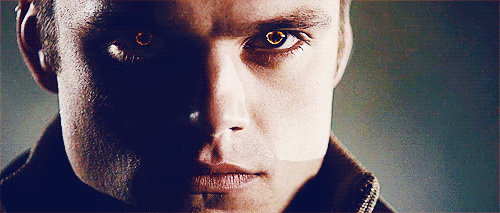 #SORRYNOTSORRY
#SORRYNOTSORRYMagic that’s actually magical. Magic can have some rules and limitations, but I don’t want it to be Maths – there needs to be an element of wonder to it, and wildness; it should be a force that can’t quite be explained, something that’s beautiful even when it terrifies. I see this most often referred to as ‘soft magic’, with ‘hard magic’ being magical systems that are more a slightly esoteric science than anything else, but as far as I’m concerned, there’s magic that’s actually magical, and magic that has all the actual magic sucked out of it. And I know which I prefer!
Heroes tapping new depths of power to save the day at the last moment. Again, it’s a total cliche, but I don’t care how predictable it is: I will always have Feels when all seems lost, and the hero manages to rally/turn the tables by digging deeper than they ever have before.
M/F pairings where the girl/woman is the dominant partner. I see this so rarely I’ve ended up writing it into all of my original stuff, and most of my fanfic too.
Male love interests who are alphas on the street and subs in the sheets. This is obviously related to the previous trope, and is what it says on the tin: I definitely have a Thing for powerful males who yield that power when it comes to romance and sex – and who don’t have crises of masculinity about it, either.
Heroes not keeping secrets. I hate stories where the main character finds out about the supernatural (whatever form that might take) and then proceeds to keep it secret from everyone around them, instead of reaching out for help and support. I love seeing siblings, friends, and partners being drawn into the adventure at the side of their loved one, even if they don’t share the powers/gifts of the main character.
Found families. Whether it’s because their blood-relatives are awful, far away, or dead, getting to see a group of friends who are close enough to call each other family is my jam. Adults and younger people forming parental bonds despite lack of a blood-tie is A++ too.
Non-humans that feel alien. Too often non-human characters are basically just humans with a few peculiarities; whether they’re elves or Martians, I love non-humans that genuinely feel different from humans, with alien cultures and modes of thought. It doesn’t have to be super drastic; Barbara Hambly’s vampires, for instance, or the various alien species from Becky Chambers’ Wayfarer series, manage perfectly without drowning readers in worldbuilding. (Not that I mind being drowned in worldbuilding. But I’m told most people do, so I understand why most people don’t write the level of detail I’d prefer in a perfect world.)
Normalised queerness. Give me fantasy and sci-fi where humanity has moved past at least some of its prejudices and someone being some flavour of queer is no longer noteworthy. Or fantasy worlds (or cultures) where it was never an issue to begin with. Where poly relationships are the norm or at least common, where people don’t bat an eye at two women getting together, where people are baffled at the idea that there might only be two genders. I don’t need it to be plot-relevant or anything, but spec-fic with normalised queerness is something that’s practically guaranteed a shot from me. I’m not promising to finish it, if it’s not a good story otherwise, but it’ll tip me over the line into picking it up if I’m not sure whether or not to try it.
And that’s it from me. What are some of YOUR favourite tropes?
August 8, 2019
Fighting the Future, For the Future: The Heart of the Circle by Keren Landsman
Representation: PoC, mlm or m/m
on August 13th 2019
Genres: Urban Fantasy, Secondary World Fantasy, Queer Protagonists
Buy on Amazon, The Book Depository
Goodreads

Sorcerers fight for the right to exist and fall in love, in this extraordinary alternate world fantasy thriller by award-winning Israeli author Keren Landsman.
Throughout human history there have always been sorcerers, once idolised and now exploited for their powers. In Israel, the Sons of Simeon, a group of religious extremists, persecute sorcerers while the government turns a blind eye. After a march for equal rights ends in brutal murder, empath, moodifier and reluctant waiter Reed becomes the next target. While his sorcerous and normie friends seek out his future killers, Reed complicates everything by falling hopelessly in love. As the battle for survival grows ever more personal, can Reed protect himself and his friends as the Sons of Simeon close in around them?
File Under: Fantasy [ Love Squared | Stuck in the Margins | Emotional Injection | Fight the Power ]
I received this book for free from the publisher via NetGalley in exchange for an honest review. This does not affect my opinion of the book or the content of my review.
I closed this book just a few seconds ago as I type this, and my head is pounding about as hard as my heart is.
Heart of the Circle is a book I’ve been looking forward to for a long time – for at least a year. It was originally published in Israel, and was then translated into English for publication in the West, via Angry Robot.
Well, I hope the final version is a bit more polished than the ARC I received – which had multiple typos and formatting errors – but the book itself? Extraordinary.
HotC is set in a world superficially very similar to our own; it’s a 21st century with mobile phones and cars and barristas and bad tv shows. But this world has sorcerers – people who can manipulate one of the classical elements, see the future, or sense and manipulate the emotions of others. What made my worldbuilding!addict self very happy was the multiple references to sorcerers having existed throughout this world’s history; we hear a bit about sorcerers in the Medieval period, and the effects of colonialist sorcery in Africa, and these things and more have contributed to the myths and stigmas modern sorcerers have to deal with. The attitude towards sorcerers is also not universal; Lee, the love interest of the story, has spent most of his life in the Confederacy – what we know as the USA – where the sorcerer community and culture is very different from what it is in Israel, where our story takes place. Landsman didn’t just slap some magic onto a carbon-copy of our world and call it a day; a lot of thought has gone into creating the world of HotC, and I appreciated all of it. More on that in a bit!
Plot-wise, the blurb is pretty accurate, but drastically undersells the impact and complexity of what’s going on here. In HotC’s Israel, sorcerers are segregated on buses and in schools (I don’t think sorcerers go to schools just for them, but there’s a mention of sorcerer students having to sit in the ‘white space’ during exams, same as the white squares they stand in on the buses), undergo micro-aggressions on a regular basis and full-on hate crimes far too often, and (judging from the slogans chanted during some of the demonstrations) can’t even vote. Reed, our main character, is an empath – what’s known as a ‘moodie’ – working in a cafe, attending rallies when he can and working as a youth counsellor for young sorcerers when he’s off the clock. All of his close friends are sorcerers of one kind or another, and all of them are involved in the political movement for sorcerer rights – something that’s becoming more and more dangerous as the hate group Sons of Simeon becomes progressively more violent. People are dying at the rallies and demonstrations, and the police seem indifferent. It’s a pretty terrible time to be a sorcerer.
And then Reed starts falling for Lee, his ex’s ex, kickstarting a chain of events that leads the Sons of Simeon to paint a bull’s-eye on his back.
Social justice is obviously one of the strongest themes of the book, but not only are there no info-dumping monologues where the writer lectures the reader (Landsman is far too good a writer to need info-dumps of any kind), we’re also presented with a surprisingly wide spectrum of opinions and political stances among the cast. In reality, social justice of any kind is messy and complicated, and even people on the same side often don’t agree on the goals of the movement, never mind the means of reaching those goals. The characters of HotC are realistically diverse in their approaches, opinions, and definitions of success, from the we-must-accept-even-those-who-hurt-us Aurora, to Lee, who calls himself a pacifist, but comes from a community where it’s understood and accepted that anyone who comes after a sorcerer is going home in a body-bag. And absolutely all of them are sometimes too tired or angry or depressed to be social justice warriors all the time – they need time off, to have fun or let off steam or just hide under the blankets for a few hours. It made them all feel incredibly real and human: these aren’t Platonic ideals or paragons of virtue – they’re completely normal people, with terrible taste in music, coffee addictions, and rules about when your roommates can bring their boyfriends over.
I’m not usually a fan of first-person narration, but I think it was the right way to go here, especially with Reed’s sorcery – I’m not sure it could have been conveyed as well in third-person. Empaths regularly deal with intense mood-swings as they pick up on the emotions of those around them, and as the tension mounts towards the second half of the book, being inside Reed’s head really helps you feel the terrifying enormity of the situation he’s in. I spent weeks getting through the first third of the book, picking it up and putting it down again – then read the rest in a little under two days. I couldn’t put it down once things picked up; Landsman’s slightly choppy, bare-bones writing (the complete opposite of the kind of purple prose that generally makes me swoon) was perfect for the boulder-crashing-down-a-hill pacing, the sense of things moving faster and faster, and the walls of a trap closing in.
And I can’t talk a whole lot about what was moving fast, or what the trap is, because that’s really something you need to discover for yourself as you read. But I’m practically bouncing with delight at how cool Landsman’s world is, and I just have to talk about it some more. Especially since so much of it is intimately tied to the plot.
For example: I have never seen empathy-as-superpower like this before. I’m actually in the middle of reading The Infinite Noise by Lauren Shippen, in which empathy might be a supersensory power, but it’s not exactly a useful one, and it was extra-interesting to be reading these two books side by side – because in HotC, empaths are unquestionably terrifying and very, very badass. Being able to fling fire around might be more cinematic, but when it comes to sorcerer battles, empaths are the ones who make or break a victory, particularly when they’re paired with seers – known as ‘damuses’ in the modern vernacular – who can not only see all the possible timelines, but decide which one they’re in. At one point, Reed describes a training battle from his time in the IDF (in HotC, as in our world, it’s mandatory for everyone to serve a set period in Israel’s military), in which he and his best friend, Daphne, a seer, took on 50 elementalists – and the elementalists still complained that they were outnumbered. Daphne’s job is to pick the timelines in which bullets (or fireballs) don’t hit her or Reed – leaving Reed free to take out the enemy. Seers safeguard, empaths wipe the floor with their opponents, basically. At least once they’ve had a little training.
Empaths are also able to transfer emotions between people, something I don’t think I’ve seen before, and which intrigues me – if emotions are the result of various chemicals and hormones, how can you transfer depression into a brain that’s not depressed? Being able to trigger someone’s brain into creating depression, sure, I can see that, but…well, it’s magic, even if no one quite calls it that. I’m interested, but I don’t need a scientific breakdown of how it works.
This is all really impressive, but about a third of the way through the book there is An Incident in a night-club where we see just what kind of precision a trained empath is capable of, and it is simultaneously jaw-droppingly incredible and, when you stop to think about it, properly terrifying.
Empaths have a particular role in the sorcerer-justice movement – they walk on the edges of the marches ‘listening’ for anyone who means them harm – and they have a unique place in the creation of media, being able to imbue art (including the written word) with emotions that viewers or readers can then feel for themselves. Reed works as a ‘moodifier’ for a bit during the book, and I really would have loved to see more and know more about it – is this how all art all over the world, and throughout history, works??? Are artists not expected to elicit emotions with their art, but just…have those emotions imbued in it after the fact??? If the imbued emotions wear off eventually, how does that work when you’re moodifying a manuscript – will all the printed copies of the book have the emotions in them? I HAVE SO MANY EXCITED QUESTIONS!
Ahem.
But although Reed’s empathy plays an enormous role – it’s an intrinsic part of who he is, something that’s made extra clear when another character points out how he (and other empaths) are useless at reading body language because they’ve never had to learn it – especially in his relationship with fellow empath Lee (and by the way, the way they use their empathy to melt into each other psychically is both beautifully written and far more intimate than sex), the Big Dramatic Plot is much more…dictated? If dictated is the right word? – by the seers, and how their powers work. The silent, invisible battle between rival damuses – all of whom are trying to manifest conflicting timelines where their side comes out on top – is both intricate and chilling. Questions of inevitability, fate and destiny come up hard against free will and personal choice – none of which have easy answers, all of which have costs attached to them. One of the scariest conflicts revolves around Reed making the future he’s been fighting for by being himself – Daphne and the other seers can only help so much, before their interference alters the decisions he’ll make, and therefore the timeline that will be created. It reminded me of Rachel Aaron’s Heartstriker series, where the main character Julius is also a linchpin of a prophet’s plans…but can’t be told anything about those plans without unmaking them. Although I love the Heartstriker series dearly, it did feel a lot less like a tease here, and much more like an inevitable, intrinsic aspect of being surrounded by seers.
Ultimately I think that’s what makes Heart of the Circle really special – how real it all felt. From the slang and subtle hand-signals sorcerers use amongst themselves, to how believable the character relationships and dynamics were, to all the ways great and subtle Landsman’s world differs from ours, this felt like a book I could step through like a doorway and find a real place waiting on the other side. Even the cinematic, X-Men-worthy showdown at the book’s climax didn’t feel unbelievable – on the contrary, I felt like I should be ducking the fireballs and getting under cover! So it is with great delight that I can say that Heart of the Circle lived up to my hopes for it, and I very much hope everyone snags a copy come publication day.

July 16, 2019
my auto-buy authors
Top Ten Tuesday was created by The Broke and the Bookish and is now hosted by Jana at That Artsy Reader Girl. Check out upcoming Top Ten themes on Jana’s blog!
Today’s TTT is about those authors whose works you pre-order before you’ve finished hearing the pitch of their next book, because you know that no matter what they’re writing about this time, it’s going to be For You.
…I have quite a few of those, I’m not gonna lie. And I really don’t think I can do justice to any of them with neat little sound-bites, but I guess I’m going to give it a go.
Catherynne M. Valente
Do you have time to discuss our lady and saviour Catherynne Valente? is my not-really-a-joke response to anyone asking about my favourite writers. I still remember discovering Palimpsest when I was 17, the epiphany of it, this book about a magical city you can only reach by having sex with someone else who’s been there. And that makes it sound smutty, which, no offence intended to smut, but it isn’t. It is about sex, though. It’s bizarre, and breathtaking, and the language…! The way Valente uses language is nothing short of real, actual magic, and besides the fact that Palimpsest showed me that sex can be beautiful, it was the…the rich, lush, hedonistic way Valente writes that made me sit up and pay attention, that made me think oh gods, yes, THIS, this is what I’ve been waiting for my entire life!
I was that kid who never really grew out of being in love with purple prose, okay? And Palimpsest – it was like someone asking, who said you had to?
And also, hey, you like language you can bite into like goblin fruit, that you can lick off your fingers while it drips down your chin? WATCH THIS!
That’s without even getting started on Valente’s imagination, on how weird and wonderful every single thing she writes is. Magic STI cities in other worlds. Space exploration with black-and-white movies and planets like fantasy-lands. Snow White in the Wild West. THE ENTIRE FAIRYLAND SERIES. You know how fantasy is supposed to be about magic? And you know how magic is supposed to be magical? As in wild, wondrous, strange, epic, stunning, soul-shaking?
That’s every single one of Valente’s works. Without fail. Fantasy or sci-fi or both. It’s been almost 10 years since Palimpsest found me, and I’ve read everything of Valente’s I could get my hands on, and I’m going to keep reading everything of hers I can get my hand on. She’s working on a new adult novel about Space Eurovision? I’m there. A Middle-Grade story about the Bronte siblings? Sign me up. A support group for fridged superheroines? Reserve my copy now. I’ve followed Valente into parts of the spec-fic world I thought I’d never go, and found myself in love with tropes and themes I’ve always hated before. So I don’t need to know anything about a book except that she’s written it. I’m going to keep following her, wherever she leads.
Jacqueline Carey
The author of the Kushiel Universe can write whatever she wants, and I will buy it. I will admit I didn’t enjoy Carey’s venture into urban fantasy – but I’m determined to re-read those books at some point, and I wouldn’t be surprised if I liked them upon a re-read. And everything else she touches is gilded.
Kushiel’s Dart is basically my holy text. Someday I’ll figure out how to write about it properly. But for now it’s probably enough to leave it at that.
Sarah Rees Brennan
I no longer have any memory of how Demon’s Lexicon ended up in my hand, but I’m so delighted that it did, and I’ve been following Brennan’s career ever since. She is wickedly funny, and wickedly clever – she takes normal fantasy tropes and twists them, takes the predictable and turns it into something subversive. Her novel In Other Lands – which started out as Turn of the Story, a serial novel she posted for free online (and which was greatly expanded and improved for its rebirth as IOL, although I would have said improving it was impossible) – is a freaking masterpiece, but none of her other works should be neglected either. Her books trick you into thinking, while bubbling like champagne even while they’re making you sob your heart out – and it’s wonderful.
Barbara Hambly
I’ve re-read Hambly’s James Asher series every year for five years. You’d think I’d be unable to stand them by now, but I just. Hambly’s writing makes me swoon. It’s just so beautiful. To the point that I actually held my nose and dove into her Benjamin January series – which is historical fiction.
There’s nothing wrong with historical fiction. It’s just that I don’t read it. UNLESS IT’S BARBARA HAMBLY. THEN I CAN’T RESIST.
Just. Her writing!!!
Courtney Schafer
Schafer hasn’t got a huge backlist yet, but after how she ended the Shattered Sigil trilogy? I will follow her literally anywhere. And I can’t say anything, because spoilers, but – gods, I love those books. I was part of the Kickstarter to get the final book published after Night Shade screwed her over, and – I would have been happy if it hadn’t ended how it did, but I was hoping, hoping so hard, and then it did. And I doubt I’ll ever be able to put into words how incredibly amazing it was to see that in print- the first time I’d ever seen it acknowledged as a real thing outside my own head – but it does mean that Schafer has a fan for life in this corner.
K.D. Edwards
I guess there aren’t a whole lot of guys on this list, huh? But the ones who are are incredible. Edwards is another writer without a long backlist – yet – but The Last Sun sent him straight onto my auto-buy list. I hope the Tarot Sequence will be going on for a long time, but I’ll be following him to whatever project he goes on to after that. It’s not often that I’m this certain of an author after just one book, but I’m damn sure this time.
John Schoffstall
Schoffstall is another writer who – as far as I know – has only published a single book – but that one is more than good enough that I’m keeping my eyes peeled for his next one, and will SLAM that pre-order button when it appears. His novel Half-Witch is the kind that comes along once in a generation if you’re lucky, and I would link you to my review but it’s on Goodreads and we’re avoiding all Amazon holdings today. I’ll have to come back and edit the link in tomorrow, because damn, so many of you are missing out by not having heard of this book!
Daniel Abraham
Abraham got my attention with the sheer originality of his Long Price quartet, a series that is to this day like nothing else I’ve ever read. He then wrote the Dagger and Coin series, which pretended to be traditional sword-and-sorcery, and turned out to be anything but (I’m so glad I took that gamble. Woah.) I’ve also started reading his sci-fi, which he writes under the penname James SA Corey, I believe – he writes the Expanse series that has become a popular tv show, which I will not watch until I’ve caught up with the books. Basically, he’s made it very clear that he’s one to watch, and I’m really excited for when he next returns to the fantasy genre. Luckily there’s plenty of Expanse books for me to read while I wait.
Deborah A. Wolf
I’ve talked a little bit about how much the Dragon’s Legacy books mean to me on here; every page of them has just cemented Wolf’s place on my auto-buy list even more tightly. She’s such an amazing worldbuilder and her imagination is so – !!! And she writes like magic is real, like someone who remembers that magic is supposed to be wild and beautiful even when it’s terrible, and that is something that will always get me by the throat. There are so few writers (that I’ve found, at least) who really make their magic feel magical. Wolf does.
I’ve been less enthusiastic with her urban fantasy series, but to be fair, there’s only one book out so far and I did really enjoy it. I just wasn’t swept away by it the way I was by the Dragon’s Legacy. It’s not bad, it’s just that Dragon’s Legacy…kind of outshines anything you place beside it. You know?
T. Kingfisher
Also known as Ursula Vernon, I realised Kingfisher had me well and truly hooked when I saw that her next novel is a horror one…and I wanted to read it anyway. Not because the premise sounds at all like my thing – but because it’s Kingfisher. Whether she’s writing incredible fairytale retellings, making me laugh out loud with clockwork centaur monsters, or breaking my heart with little girls having adventures with were-houses (no, that’s not a typo: were-houses) I have loved everything of hers I’ve read. (She has a collection that is literally just her annotations and notes on a bunch of old fairy tales? And it is still my go-to book when I’m depressed, because I always end up crying with laughter. DO NOT READ IT AT 3AM WHILE YOUR PARTNER IS TRYING TO SLEEP, IS WHAT I’M SAYING.) I’m nervous of following her into horror, but…it’s not like I can ignore a Kingfisher book! That would be madness!
What about you guys? Do you have an auto-buy list? Who’s on it?
July 12, 2019
fall into fire, rise like a phoenix: David Mogo, Godhunter by Suyi Davies Okungbowa
 David Mogo, Godhunter by Suyi Davies Okungbowa
David Mogo, Godhunter by Suyi Davies Okungbowa Representation: PoC, wlw relationship among secondary characters, disabled character
on 9th July 2019
Genres: Urban Fantasy
Buy on Amazon, The Book Depository
Goodreads

Nigerian God-Punk - a powerful and atmospheric urban fantasy set in Lagos.
Since the Orisha War that rained thousands of deities down on the streets of Lagos, David Mogo, demigod, scours Eko’s dank underbelly for a living wage as a freelance Godhunter. Despite pulling his biggest feat yet by capturing a high god for a renowned Eko wizard, David knows his job’s bad luck. He’s proved right when the wizard conjures a legion of Taboos—feral godling-child hybrids—to seize Lagos for himself. To fix his mistake and keep Lagos standing, David teams up with his foster wizard, the high god’s twin sister and a speech-impaired Muslim teenage girl to defeat the wizard.
I received a free arc of this book from the publisher via Net-Galley, in exchange for an honest review.
I don’t know where to even start when it comes to talking about this one. It blew my mind to the point that even now, several days after I finished, I’m still reeling.
When I dissect what I read, it’s a little difficult to figure out why it had so much impact; superficially, this is a story I’ve read many times, a coming-of-age tale wherein a young man must claim his full, supernatural potential in order to save the people and place he loves. I mean, that’s an ancient story; we’ve been telling variations of it for eons, right?
But as with all stories, it’s how you tell it that matters. It’s the script and the costumes and the set dressing, the stage make-up and the actors you cast for the roles, that combine to make a story unique regardless of how many times it’s core has been told before. And I really feel like Okungbowa has done something special here.
I remember the first time I read a Russian fantasy novel (in translation!) and realised that it’s more than setting that changes how a story feels; just as I can’t (generally) stand books published in the 90s or earlier because the writing style of the time just doesn’t work for me, different parts of the world seem to have their own styles, too – it’s not limited to time periods. Australian fantasy is just different to (North) American fantasy, as is Russian, as is German, as is Chinese. I don’t have the linguistic or literary knowledge to put into words exactly how they’re all different – and it’s not like they’re a monolith or anything. But it’s clear to me that different cultures flavour their stories differently – which makes perfect sense when you think about it, doesn’t it?
David Mogo, Godhunter is like that; it doesn’t feel like an American or (Western, I have no experience with Eastern) European fantasy novel. Maybe it wouldn’t feel quite so mind-blowing to someone more familiar with Nigerian literature (or, honestly, Nigeria in general), but for me, raised on a very Western diet stretching from Lord of the Rings onwards, it felt brand-new and fresh and raw and dizzying, all at once. I can’t say for sure, having never been there, but what I want to say is that it’s more than the fact that DM,G is set in Nigeria; I think it might intrinsically be a Nigerian story, coming from a literary tradition I’m not familiar with, influenced by a culture I don’t know.
I just don’t think a white British author could have pulled this off, is what I’m saying here.
And to be honest, I suspect that that might be at the root of many of the negative reviews I’ve seen for this book; DM,G is so different stylistically from what most of us (white, Western) readers are familiar with that I can see why some people might reject it, without ever quite being able to put their finger on what it is that actually bothers them about what they’re reading. I will freely admit I struggled to adapt for the first few chapters, and I absolutely had trouble learning everyone’s names and keeping them all straight – but that was solely due to my own unfamiliarity with Nigerian names; I have the same problem with Finnish names, and I’ve been living in Finland for years now. If you’ve never read a Nigerian novel before – if you’ve never strayed far from your comfort zone of straight, white, mostly-cis-male writers – then yeah, you’re going to have to put some extra work in in order to get the most out of this book. But it’s damn worth it.
And besides, Okungbowa is very considerate of his white readers; I’ve seen reviews complaining about info-dumping, but a) I found all the info I needed woven very deftly into the narrative, and b) I needed that info! When I pick up a book by a white American man, I’m engaging with a literary tradition I’m familiar with; just like fanfiction writers don’t need to introduce the characters – because the readers are fans who already know those characters – no one needs to break down a generic Medieval-esque-European setting for me. No matter how original the story, I recognise and understand something about its basic nature. I didn’t have that to fall back on with DM,G – which made everything new and interesting in a way I don’t get to experience often, but yes, also meant Okungbowa needed to introduce me to…well, a lot. And you know what? He did it incredibly well. I never felt overwhelmed, bored by information I didn’t care about, or confused about what was going on. One example stands out very clearly in my memory; during a battle scene, David is faced with a kind of monster he knows but that this particular white reader did not – a creature from Nigerian mythology. And I was awed at how quickly and perfectly Okungbowa conveyed the information I needed during a fight scene, without bogging down the action at all. Worldbuilding via fight scene? That’s just ridiculously impressive.
Another critique I’ve seen is that the dialogue shifts between what I wince to call ‘proper’ English and what is probably Naijá, or Nigerian Pidgin (although it’s never named in the book), and look – even I know that people switch back and forth between British English and Naijá depending on the situation and setting, and probably mood and personal preference too. That David speaks British English with some characters some of the time, and Naijá at other times – particularly with his adopted father, who speaks Naijá exclusively – is completely normal. It would be weird if he didn’t. Was it sometimes hard to understand what was being said? Sure, but no more so than when LotR delves into Elvish. When a fantasy book has instances of a fantasy language, 99 times out 100 context makes the meaning clear, and the same is true with this book (which, let me reiterate, is not using a fantasy language, it’s a real language real people speak and which the characters are obviously going to be familiar with). And as someone who tears her hair out every time Hollywood shows us Germans speaking English with each other when there are no native English speakers present, I appreciated getting to see these characters speak like, you know, real people. It anchored the fantastical elements really well.
Look, I will defend this book against all comers, okay? Okungbowa not only came up with an amazing premise, he wrote a story that lived up to it – how often does that happen? The magic! The fight scenes! And oh my gods (literally), the mythos! The more that was revealed about the Falling – when the gods showed up on Earth – and what had caused it and also, you know, the nature of gods and the various pantheons and everything – the more I learned about that, the more I wanted to gush about this book to literally everyone. I am so in love with so many things I can’t talk about here because spoilers, which is so frustrating! I don’t know how to convince you to go read this when I can’t tell you why.
But basically, if you’re not afraid of moving away from traditional (blegh) fantasy, if you’re into cinematic magic and mythology and seriously weird found-families, if you want grit along with your action, if you want something new and wonderful, then this is definitely a book for you.
Seriously, give it a go. I can’t imagine regretting it.

July 9, 2019
This book will put a spell on you: Darkling by Brooklyn Ray
 Darkling (Port Lewis Witches, #1) by Brooklyn Ray
Darkling (Port Lewis Witches, #1) by Brooklyn Ray Representation: Transgender, mlm or m/m
Genres: Urban Fantasy
Pages: 126
Buy on Amazon, The Book Depository
Goodreads

Port Lewis, a coastal town perched on the Washington cliffs, is surrounded by dense woods, and is home to quaint coffee shops, a movie theater, a few bars, two churches, the local college, and witches, of course.
Ryder is a witch with two secrets—one about his blood and the other about his heart. Keeping the secrets hasn’t been a problem, until a tarot reading with his best friend, Liam Montgomery, who happens to be one of his secrets, starts a chain of events that can’t be undone.
Dark magic runs through Ryder’s veins. The cards have prophesized a magical catastrophe that could shake the foundation of Ryder’s life, and a vicious partnership with the one person he doesn’t want to risk.
Magic and secrets both come at a cost, and Ryder must figure out what he’s willing to pay to become who he truly is.
Word Count: 33200
CONTENT WARNINGS:
Blood-letting (consumption of blood); Explicit Sexual Content; Death and Resurrection of an MC; Mild Gore (very mild)
Wow do I have thoughts about this one.
Like – let me get it out of the way and say that this is beautifully written (seriously, Ray’s description and pacing and tone and everything seduced me looong before we got to the sex scenes); the characters are fucking awesome; the magic is breathtaking; the worldbuilding is such a tease, there are so many lovely and intriguing bits and pieces of this world and I demand to know more about all of them; and the sex scenes are just –
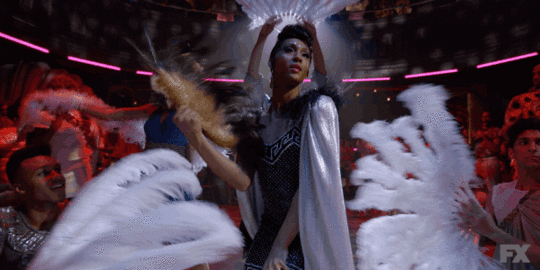 THIS IS HOW MANY FANS I REQUIRED TO COOL MYSELF DOWN.
THIS IS HOW MANY FANS I REQUIRED TO COOL MYSELF DOWN.I am a sex-repulsed asexual, okay? NOBODY’S SEX SCENES ARE SUPPOSED TO MAKE ME FEEL LIKE THIS. I HAVE NO IDEA HOW TO HANDLE IT.
CONGRATS RAY, YOU BROKE ME.
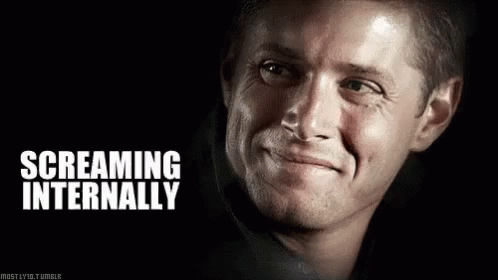
What I’m saying here is, on all the fronts that most readers care about, this is amazing, you need go read it, WHY ARE YOU STILL HERE GO READ IT AND COME BACK.
Ahem.
But I actually ended up dusting off my English Lit & Language A Level and going deep on this one. For a novella of less than 200 pages, Darkling packs a whole lot into a small space.
(It’s perfectly spaced, by the way. Darkling is exactly as long as it needs to be; it doesn’t feel rushed or overfull in the slightest. I hope to get my hands on a full-length Brooklyn Ray novel someday, just so I have more pages to hedonistically roll around in, but Ray really knows what they’re doing when it comes to pacing and length. I’m not sure I’ve ever seen a writer make use of the novella format so well.)
SO ANYWAY, I HAVE MANY THOUGHTS AND I NEED TO SHARE THEM.
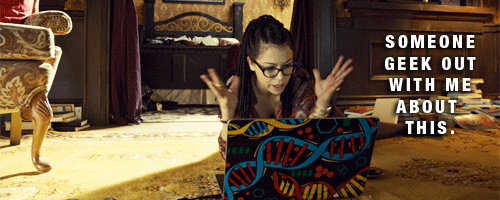 SOMEONE. ANYONE.
SOMEONE. ANYONE.A little bit of context for the fools among you who haven’t read this yet; our main character, Ryder, is a witch among a hidden-from-us-mere-mortals society of witches: this is urban fantasy set in our world, where the vast majority of people are unaware magic exists. (Being a witch also seems to be genetic; at least, I did not catch any references to witches who learned to be witches, as opposed to those born into one of the witch clans. So you’re either born with magic or you’re not, I think). Ryder is also a trans man, but that’s less important than the fact that he is half Elemental – witches who, shocker, have control over one of the elements and whose magic is then heavily influenced by that element (Ryder’s Elemental powers over fire, for example, lend themselves to illusion spells, which witches of other elements need to work harder at) – and half Necromancer. Necromancers are even more clannish than the other witch clans, probably because other witches see them as Terrifying and Also Evil. Unsurprisingly, your average witch doesn’t seem to have a very detailed picture of what exactly Necromancers do, only that it’s Dark Stuff. And Ray doesn’t try to soften the trope to make it more palatable; necromancy involves a lot of cutting, blood-letting, and a rite of passage where the necromancer in question literally dies and comes back to life. Necromancers also seem to be the only witches who strike deals with demons, although the question of what exactly demons are – and whether they’re the Default Evil that most people think they are – is brought up over the course of the story, and I hope to get a clearer answer to that question at some point. As an angelology and demonology nerd, I’m very interested.
But! So Ryder is half-Necromancer. His friends – the small coven he’s a part of – do not know this. (They also don’t know he’s trans). But when his Necromantic powers start to get out of control, he doesn’t have much of a choice but to admit the secret.
That’s the plot. But now I want to analyse.
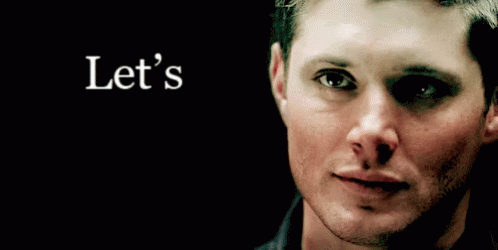 Smexy evil!Dean is waaay too appropriate here.
Smexy evil!Dean is waaay too appropriate here.First off, I find it fascinating that Ryder’s powers – the battle between which kickstarts and defines the book – are fire and necromancy; it’s a very clear bit of Light vs Dark, a black-and-white divide, which is exactly how the magical world seems to see it. These are incompatible forces in the same way that Elementals and Necromancers are supposedly incompatible; the conflict which threatens to destroy Ryder from the inside-out (his magic/s will kill him if he can’t get this sorted) only seems to confirm that these two types of magic – and the two kinds of witches – cannot, and should not, co-exist.
(Of course, Light and Dark are also complimentary forces. The yin/yang symbol, which embodies the entirety of creation, is made up of both in equal parts. Only having one or the other won’t get you very far, if you’re creating a universe; you have to have both.)
But of course, Ryder’s very existence proves it’s not as simple – or as black and white – as the Elementals in particular would really like it to be. Presumably if the two types of magic really couldn’t co-exist, then Ryder’s conception wouldn’t have been possible – and anyway, it’s not a clear case of ‘Elemetal magic = good, necromancy = bad’. Any modern witch can tell you that the classical elements are dual-natured by default; fire warms, but it also burns, and the tidy candle-flame is the same creature as the inferno – it’s only a matter of degree. (…Pun unintended.) In the same way, Ryder’s necromancy can restore life as well as drain it, and as for blood magic, well – despite how any kind of blood-related magic is typically depicted as Evil, capital E, in Western media, blood is also pretty literally liquid life. And as mentioned above, the ‘demons’ some Necromancers bargain with are not the kind you might recognise from Sunday School or Hollywood horror movies.
So Elemental and Necromatic magic are – like most things – more about how they’re used, as opposed to being Good or Evil by default. (One scene that especially drives this home is when one Air witch prevents another witch from breathing while delivering a lecture. It happens off-page, but it still makes it clear that Elemental witchery can be plenty fucked-up, without any need for blood sacrifices or whatever).
Regardless, Ryder is clearly depicted as very literally dual-natured. With that in mind, the fact that Liam – Ryder’s eventual lover – is a Water witch also seems very heavy in symbolism: water is the equal-and-opposite match for Ryder’s fire, and like fire is traditionally associated with creativity and new life/creation. But the ocean – where life on this planet originated – also has its own terrifyingly dark depths. On all levels then, Liam is, symbolically, a perfect match for Ryder – which is important, because Ryder is, to put it mildly, a fucking badass, and anyone who’s going to love him needs to be able to be his equal.
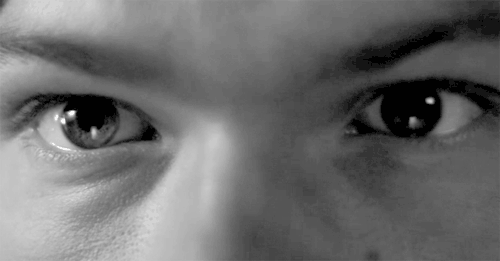 Piss Ryder off at your own peril.
Piss Ryder off at your own peril.…Unless you find black eyes as sexy as I apparently do.
Now, if I were really taking an English Lit exam on this book (and oh my gods I would love that so much) I don’t think I’d be able to resist taking all this dual-natured symbolism to Ryder’s queerness… And I can’t really resist it now, so let’s hope I don’t fuck it up. But point one: I love, and am fascinated by, how Ryder bucks both the magical and gender binaries, and I have to wonder if that was random whim or deliberate symbolism on the author’s part. By his very existence, Ryder is the embodiment of ‘your gender binary is imaginary’, as is any genderqueer person – but he sends the same message to the magical community by existing as both an Elemental and a Necromancer. While Ryder is dual-natured magically, though, I don’t consider that analogous to being trans; Ryder isn’t bigender or genderfluid – he’s a man, full-stop. And I think that’s important, because it seems to be treading dodgy waters to claim his trans-ness is a reflection of his magic, or vice versa – because the implication then is that his gender identity is dual-natured, which it isn’t. His magic and his gender both break their respective binaries, but not in the same way, and I think that’s a good thing. Otherwise the implication might be that his dual-magic made him trans, and that’s…a weird place to go, worldbuilding-wise. Especially when it’s made repeatedly clear that Elemental/Necromancer witches are completely unheard of, so if it was a case of dual-magic ‘causing’ someone to be trans…trans witches would basically not exist, in this context? Which would suck? And going the other way – of Ryder being Extra Magical because he’s trans – can also get murky; I personally love stories where characters being queer or disabled or nuerodivergent gives them abilities others don’t have…but I also acknowledge that by doing so, a story is still marking out those characters as ‘different’, aka, ‘not like the rest of us’. It’s positive Othering…but it’s still Othering.
And it’s not something we need to worry about right now, because Ray doesn’t do that with Ryder. But to get back to my original point: you don’t need a reason to make a character trans, any more than you need a reason to give them brown eyes or glasses. But I do wonder if Ray specifically wrote this story – that of a dual-natured witch having to deal with his conflicting magics – with a trans character because it maybe wouldn’t have the same symbolic impact coming from a cis character.
But unlike with his magic, Ryder is – delightfully – not in conflict about his gender. Quite the contrary; his choice not to come out to his coven seems born out of a realistic understanding of how cis people generally react to that kind of ‘revelation’, as well as a ‘it’s none of your damn business’ mindset – not any kind of internal shame or self-worth/-image issues. Ryder is afraid of how Liam will react to the knowledge, but he himself is more than comfortable with his own gender identity, sexuality, and body. Darkling is not a case of a cis author writing about the suffering of a trans character because they can’t envision a trans character having any other kind of story – it’s a defiantly sex-positive, queer novella from a queer author that flips the bird to anyone who might blanch at it.
(Can you tell I love it???)
Ryder’s ease with his body is, perhaps, mirrored in his unwillingness to give up either his fire powers or his necromancy – he is both Elemental and Necromancer, and only risks the loss of one half of his witchcraft when it’s do-or-die (-or-kill). He refuses to be shamed for his Necromancer heritage/nature, even when most of those around him demonise Necromancers to a degree that would be laughable if it wasn’t a kind of prejudice we see far too often in the real world; his defiant embracing of both his magical aspects seems very symbolic of the trans experience, in telling the world to fuck off when it tries telling you what you should be. Ryder is as certain of his identity as an Elemental and Necromancer as he is certain in the knowledge that he is a man, whatever anyone else might think – and it’s fucking glorious.
However, as previously stated, this is not a suffering!trans book (thank the gods). That Ryder is trans is effectively a non-issue; the revulsion and prejudice he faces is based pretty exclusively on his being a Necromancer, and in particular his refusal to accept that there’s anything wrong with being a Necromancer. There is no dysphoria, not even when it comes to the (literally steaming hot) sex scenes; this is not a transition story (except in the sense of his coming into his powers) or a coming-out one (except, again, for his ‘coming out’ re his magical heritage – out of the broom closet, if you will.) Like I said earlier, although you can draw a symbolic link between Ryder’s magical- and gender-identities, that’s purely on a ‘literary analysis, scope-it-out-with-a-magnifying-glass’ level – from the story’s perspective, Ryder just happens to be trans; he’s not trans because he’s a dual-witch, and he’s not a dual-witch because he’s trans. He’s trans because trans people exist, not because this is a ‘trans issues’ book.
I suppose, in some other universe where Ryder is not trans, an English Lit student could argue that his disparate magics, and the conflict surrounding them, is a symbolic stand-in or metaphor for the queer experience. But I much prefer this reality, both because it is just epic to see a trans witch be such an incredible (and fucking sexy) badass – and because I’m tired of having to read into a text to find purely metaphorical queerness, instead of getting to just read a fantastic story with canonical queerness front and center. The way it damn well should be!
Now, I’ve talked myself in circles, and probably repeated myself far too much. But I hope anyone who’s made it this far has at least gathered that this is a freaking amazing book, and that Brooklyn Ray is mindblowingly skilled to have packed so much into so few pages. You can take it as read – pun fully intended this time – that I will be devouring the rest of the series, and any future books Ray cares to publish.
I leave you with one last sexy black-eyes gif, and a small personal headcanon.
 Ryder’s eyes go black when he’s pissed, but without the ring of fire effect. However, it is absolutely my headcanon that this is how it looks once his Fire and Necromancy are aligned and in sync.
Ryder’s eyes go black when he’s pissed, but without the ring of fire effect. However, it is absolutely my headcanon that this is how it looks once his Fire and Necromancy are aligned and in sync.
July 8, 2019
Must-Have Monday #5!
Tomorrow sees the release of three books I’ve been incredibly excited about for a long time!
 Speak the Ocean by Rebecca Enzor
Speak the Ocean by Rebecca Enzor on 9th July 2019
Genres: Fantasy
Buy on Amazon, The Book Depository
Goodreads
For Mer handler Finn Jarvis, the feral mermaid performers at Oceanica Marine Park are nothing more than ruthless aquatic predators, violent and unpredictable. That doesn’t stop the public from flocking to one of the world’s most popular tourist attractions. To them, the Mer are magical entertainment, too beautiful to be dangerous. They don’t see what happens to the ones who dare swim out of line.
Newly caught Erie doesn’t know what the evil landfolk want from her. Alone and voiceless, she watches the other merfolk from the confines of her tank. Broken into submission, they’ve become shells of the once vibrant creatures she knew. But Erie refuses to be subjugated. She’ll get the crowds to see her as something more than simple entertainment—starting with her captor, Finn.
While Finn trains Erie in her routine, she secretly teaches herself the air-words he and the other trainers speak. And when the language barrier falls, Finn starts to realize that the gap between human and Mer is smaller than he thought, and maybe it’s not the Mer who are monsters, after all.
I could have sworn this book contained LGBT+ themes when the premise first crossed my screen, but whether I hallucinated them or they’ve been removed, this still looks like an incredibly interesting story. I haven’t read a lot of books where mermaids were done well – Waterfire Saga I am looking. at. you. – but merging mermaids with the controversy of Sea World? Hell yes, sign me up. I want to see where this goes!
 David Mogo, Godhunter by Suyi Davies Okungbowa
David Mogo, Godhunter by Suyi Davies Okungbowa Representation: PoC
on 9th July 2019
Genres: Urban Fantasy
Buy on Amazon, The Book Depository
Goodreads
Nigerian God-Punk - a powerful and atmospheric urban fantasy set in Lagos.
Since the Orisha War that rained thousands of deities down on the streets of Lagos, David Mogo, demigod, scours Eko’s dank underbelly for a living wage as a freelance Godhunter. Despite pulling his biggest feat yet by capturing a high god for a renowned Eko wizard, David knows his job’s bad luck. He’s proved right when the wizard conjures a legion of Taboos—feral godling-child hybrids—to seize Lagos for himself. To fix his mistake and keep Lagos standing, David teams up with his foster wizard, the high god’s twin sister and a speech-impaired Muslim teenage girl to defeat the wizard.
I was lucky enough to be granted an arc of this, and I. AM. SHRIEKING. It’s so good, you guys; so good! I’m not quite finished with it, damn it – I really wanted to get a review up for release day! – but I’m hoping to finish it and write up a review by the end of the week. If you haven’t pre-ordered it already, you’ve still got a few hours! Trust me, you won’t be disappointed!
 Spin the Dawn (The Blood of Stars, #1) by Elizabeth Lim
Spin the Dawn (The Blood of Stars, #1) by Elizabeth Lim Representation: PoC
on 9th July 2019
Genres: Secondary World Fantasy
Buy on Amazon, The Book Depository
Goodreads
Project Runway meets Mulan in this sweeping YA fantasy about a young girl who poses as a boy to compete for the role of imperial tailor and embarks on an impossible journey to sew three magic dresses, from the sun, the moon, and the stars.
Maia Tamarin dreams of becoming the greatest tailor in the land, but as a girl, the best she can hope for is to marry well. When a royal messenger summons her ailing father, once a tailor of renown, to court, Maia poses as a boy and takes his place. She knows her life is forfeit if her secret is discovered, but she'll take that risk to achieve her dream and save her family from ruin. There's just one catch: Maia is one of twelve tailors vying for the job.
Backstabbing and lies run rampant as the tailors compete in challenges to prove their artistry and skill. Maia's task is further complicated when she draws the attention of the court magician, Edan, whose piercing eyes seem to see straight through her disguise.
And nothing could have prepared her for the final challenge: to sew three magic gowns for the emperor's reluctant bride-to-be, from the laughter of the sun, the tears of the moon, and the blood of stars. With this impossible task before her, she embarks on a journey to the far reaches of the kingdom, seeking the sun, the moon, and the stars, and finding more than she ever could have imagined.
I mean, I have no idea where you’ve been if you missed this one somehow, but hey, no worries, you’ve found it now! With a stunning cover, glowing reviews, and a breathtaking premise, this has been on a lot of people’s most-anticipated lists, and I’m pretty confident that it’s going to live up to the hype. I can’t wait to download it to my e-reader tomorrow!
And that’s it from me! Are there other books releasing this week that I missed? Let me know!
July 7, 2019
Queer Magic and Finding Your Place: Mooncakes by Suzanne Walker & Wendy Xu
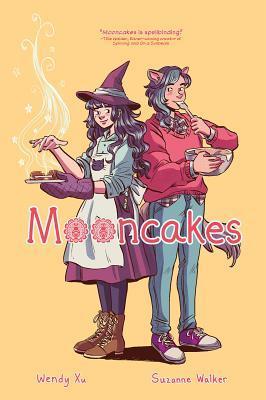 Mooncakes Representation: wlw, PoC, Non-Binary, Fat
Mooncakes Representation: wlw, PoC, Non-Binary, Fat on October 15th 2019
Genres: Queer Protagonists, Urban Fantasy
Buy on Amazon, The Book Depository
Goodreads

A story of love and demons, family and witchcraft.
Nova Huang knows more about magic than your average teen witch. She works at her grandmothers' bookshop, where she helps them loan out spell books and investigate any supernatural occurrences in their New England town.
One fateful night, she follows reports of a white wolf into the woods, and she comes across the unexpected: her childhood crush, Tam Lang, battling a horse demon in the woods. As a werewolf, Tam has been wandering from place to place for years, unable to call any town home.
Pursued by dark forces eager to claim the magic of wolves and out of options, Tam turns to Nova for help. Their latent feelings are rekindled against the backdrop of witchcraft, untested magic, occult rituals, and family ties both new and old in this enchanting tale of self-discovery.
I received this book for free from the publisher via NetGalley in exchange for an honest review. This does not affect my opinion of the book or the content of my review.
This a wonderful graphic novel that I read in a single setting – I couldn’t put it down, and had no desire to! Mooncakes felt like a summer dream – heartwarming and sweet with enough at stake to keep the plot from stagnating, with a slightly cutesy art style that perfectly suited the story’s tone. It also stands as a perfect counter to those who claim you can’t put ‘that much’ diversity into a story without it feeling forced – I was flipping pages so quickly, because the story flowed at such a natural pace, that I only realised it was ‘unusually’ inclusive when I’d finished and was pondering what I’d just read. The two main characters are Asian; one is non-binary, and the other is Deaf and being raised by her wlw grandmothers. The best friend is fat – and while she isvery funny, she’s not just there for comic relief. And nothing about this stood out as unusual in any way; they’re all just people, and the nonchalant way in which they accept each other’s differences makes them all complete non-issues – the ease with which the grandmother’s accepted and adjusted to Tam’s use of ‘they’ pronouns made me choke up a little, because that’s exactly how it ought to work.
What I mean is, the characters all feel like completely real people. You might do a double-take at the magic and werewolves, but not the hearing aids or the non-binary pronouns – not when it’s all presented so matter-of-factly and the panels are urging you on to the next bit of the story. This is how it is in real life, of course – people are just people,in all their different flavours – but it’s a complete delight to get to see it and read in in fiction too.
The story is a reasonably simple one; Nova, a young witch, and Tam, a non-binary werewolf, team up to take care of a demon in the local woods, reconnecting after many years apart and falling for each other in the process. The fact that the reader can see it coming from a mile away in no way detracts from the stupidly big grin I had on my face as I read – despite the presence of, you know, demons, this is just…a summer-dream book. That’s really the only way I know how to put it. It’s cute and sneakily deep, magical and fierce, a story about first loves and being brave and finding your place in the world, and personally, I really want a prequel about the bad-ass grandmas and their past adventures!
And I’ll try to say this without spoilers, but I adored the scene where we saw what lies beyond the magical gates in the woods. The designs of the various magical spirits, and the way in which they interact with the witches, was just wonderful. And I was ridiculously happy with our Happily Ever After. As someone who always has questions about where demons come from in any given story, I liked the explanation here and was glad everything ended well on that front too.
The perfect graphic novel to curl up with on a rainy afternoon, or whenever you happen to be feeling low. I guarantee you won’t be able to stop smiling while you read!

July 5, 2019
The #IronTomeAThon: or, Read All The Fantasy!
So it is probably an abominably bad idea, but what the hell, this sounds like a lot of fun and I need motivation!
The #Iron TomeAThon is a readerthon running throughout July, hosted by Aimal of Bookshelves and Paperbacks over here. The goal is to read adult fantasy books – no YA! – with points earned for every page read. So a 300 page book is 300 points!
There are also Song of Ice and Fire-themed prompts – basically a kind of optional reading bingo – and you can declare yourself as belonging to one or another of the Houses of Westeros. I’m excited to get reading and I’ve already had fun coming up with books that fulfil the different prompts!
So! I hereby declare myself for House Targaryen, and present my tbr list!
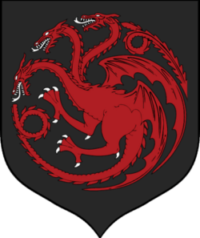
 Look, I’m not a fan of the books or show, but this shot? Someone needs to get an award for this shot.
Look, I’m not a fan of the books or show, but this shot? Someone needs to get an award for this shot.The Challenges
Castle Black: read the group book
The group book is Kuang’s Poppy War, which I had a rough time reading last year. Depending on how I feel later in the month I may give it a try, but as of this writing I don’t intend to reread it.
Winterfell: read a book set (partially or fully) in a cold environment…
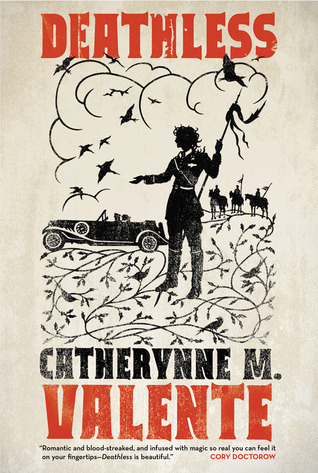 Deathless by Catherynne M. Valente (Leningrad Diptych #1)
Deathless by Catherynne M. Valente (Leningrad Diptych #1) This isn’t the book I intended to begin with, but I’ve been determined to do a Valente re-read for a while, and this seems like a good opportunity to kickstart that. Deathless is a retelling of Russian mythology set in WW2, and, well…is it even possible to tell a Russian story without also telling a winter story? I definitely remember a lot of ice, snow, and general cold in this one.
King’s Landing: read a book about or involving royalty, politics, or government…
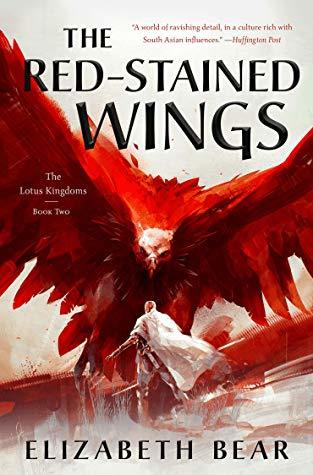 The Red-Stained Wings by Elizabeth Bear (Lotus Kingdoms #2)
The Red-Stained Wings by Elizabeth Bear (Lotus Kingdoms #2)The previous book in this series ended with one queen a captive, another desperately trying to protect her kingdom, and a royal heir also taken prisoner, all because the Bad Guys are determined to make all the little splinter Lotus Kingdoms into a single entity again. I think that means this qualifies!
Sunspear: read a book inspired by a non-Western setting or a book by an author of color or an indigenous author…
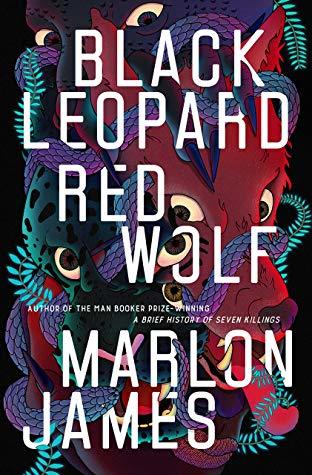 Black Leopard, Red Wolf by Marlon James (Dark Star Trilogy #1)
Black Leopard, Red Wolf by Marlon James (Dark Star Trilogy #1)This was hailed as ‘an African Game of Thrones’ pre-release, so it seems almost ironically appropriate to dig into it for this challenge. Besides, it’s about time I gave it a proper go!
Oldtown: read a book about or involving an institution of knowledge or training…
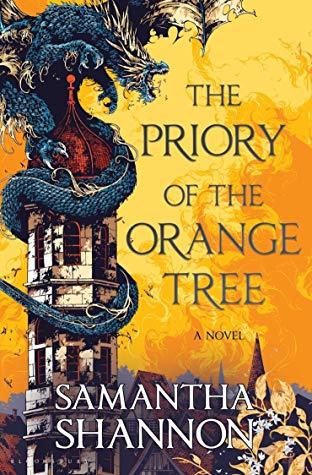 The Priory of the Orange Tree by Samantha Shannon
The Priory of the Orange Tree by Samantha ShannonBoth the eponymous Priory, and the training academy/program for dragonriders in this book, qualify this one. I suspect this challenge was aimed more at magic-school style stories, but the only one I have ready to read (which isn’t YA) is Magic for Liars by Sarah Gailey… And while I do want to read that, Priory of the Orange Tree is a book I’ve been waiting years for. I have a signed copy on my bookshelf. It’s more than time to sit down and read it.
Valyria: read a book about or involving dragons…
 The Ruin of Kings by Jenn Lyons (A Chorus of Dragons #1)
The Ruin of Kings by Jenn Lyons (A Chorus of Dragons #1)Dragon on the cover. Dragon in the series name. I know for a fact there’s the Old Man dragon who’s obsessed with the main character…because I have in fact started this book already. However, I’m going to be starting it again from the beginning for this challenge – I’ve taken so long to get as far as I have that honestly, I need to restart it anyway; there’s been so many interruptions that I don’t remember all the names and important pieces of the plot when I do pick it up. So. Time for take #2!
Asshai: read a dark/grimdark fantasy or urban fantasy…
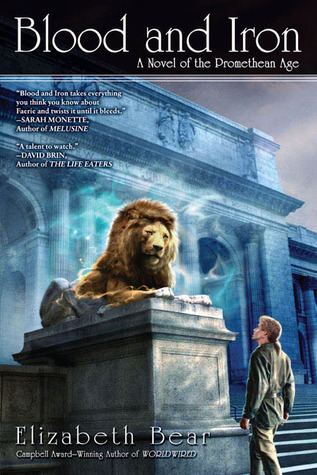 Blood and Iron by Elizabeth Bear (Promethean Age #1)
Blood and Iron by Elizabeth Bear (Promethean Age #1)I first read this book years ago, when I was 18. The last book in the series, though, went out of print the day before I finished the penultimate book! Heartbreaking! But Gollancz is republishing the series; books one and two, Blood and Iron and Whiskey and Water, have been rereleased, and the rest of them will be coming out over the next few months. I’ve been dying for a reread, and since Blood and Iron is a wonderful take on urban fantasy, this is the perfect opportunity to get started!
Personal Bonus Book
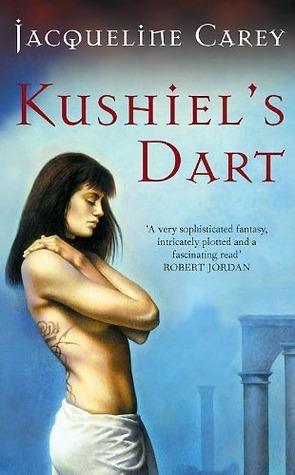 Kushiel’s Dart by Jacqueline Carey (Kushiel’s Universe #1)
Kushiel’s Dart by Jacqueline Carey (Kushiel’s Universe #1)I also intend to read Kushiel’s Dart – it’s another book I’ve been meaning to reread, and I was inspired and tickled by Aimal’s suggestion of books that could qualify for multiple challenges. Kushiel’s Dart fulfils the requirements for Winterfell, King’s Landing, and Oldtown; some would argue it also works for Asshai, since I’ve seen it called dark fantasy. In fact, according to the Namaah trilogy (books 7-9 of the Kushiel Universe), dragons exist in this verse – which means it qualifies for Valyria too! (Since Aimal specifically says, of the Valyria challenge, that ‘Dragons do not have to be essential to the plot or world, but they must exist in the world.’)
Well, they do. So I guess technically I’d only have to read the one book to fulfil all the challenges! But like I said, I’m excited to tackle all the others listed.
That’s an awful lot of pages, and I’m pretty sure I’m not going to complete them all… BUT HELL YEAH. LET’S DO THIS!
